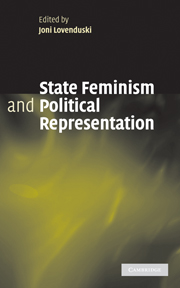Book contents
- Frontmatter
- Contents
- List of figures
- List of tables
- Notes on contributors
- Preface
- List of abbreviations
- 1 Introduction: state feminism and the political representation of women
- 2 Gendering political representation: debates and controversies in Austria
- 3 The Belgian paradox: inclusion and exclusion of gender issues
- 4 A politics for presence: state feminism, women's movements and political representation in Finland
- 5 Gendering the republican system: debates on women's political representation in France
- 6 WPAs and political representation in Germany
- 7 Gendering the debate on political representation in Italy: a difficult challenge
- 8 High tides in a low country: gendering political representation in the Netherlands
- 9 The women's movement, gender equality agencies and central-state debates on political representation in Spain
- 10 Party feminism, state feminism and women's representation in Sweden
- 11 Party government and women's representation debates: the UK
- 12 Women's policy agencies, the women's movement and representation in the USA
- 13 Conclusions: state feminism and political representation
- Appendix 1 Tables of women's representation in eleven countries
- Appendix 2 The RNGS model: summary of variable descriptors
- Index
- References
11 - Party government and women's representation debates: the UK
Published online by Cambridge University Press: 22 September 2009
- Frontmatter
- Contents
- List of figures
- List of tables
- Notes on contributors
- Preface
- List of abbreviations
- 1 Introduction: state feminism and the political representation of women
- 2 Gendering political representation: debates and controversies in Austria
- 3 The Belgian paradox: inclusion and exclusion of gender issues
- 4 A politics for presence: state feminism, women's movements and political representation in Finland
- 5 Gendering the republican system: debates on women's political representation in France
- 6 WPAs and political representation in Germany
- 7 Gendering the debate on political representation in Italy: a difficult challenge
- 8 High tides in a low country: gendering political representation in the Netherlands
- 9 The women's movement, gender equality agencies and central-state debates on political representation in Spain
- 10 Party feminism, state feminism and women's representation in Sweden
- 11 Party government and women's representation debates: the UK
- 12 Women's policy agencies, the women's movement and representation in the USA
- 13 Conclusions: state feminism and political representation
- Appendix 1 Tables of women's representation in eleven countries
- Appendix 2 The RNGS model: summary of variable descriptors
- Index
- References
Summary
Introduction
Although parliament is formally sovereign, UK decision-making is determined by party government. Supported by a single member simple plurality electoral system that normally produces working majorities for the winning party in the House of Commons, governments are dominated by a cabinet composed of majority-party politicians that is in turn dominated by the prime minister and a few other senior ministers. Party government secures the centralisation and closedness of the political system. Party discipline secures passage of government bills. Formally accountable to the House of Commons, the power of the cabinet is such that the system is frequently referred to as an ‘elected dictatorship’. Major decisions are taken by a combination of a minister, their policy advisers and civil servants. Details of decisions are worked out in the civil service where legislation and other policy documents are drafted. The formal arrangements conceal the extent to which decisions are significantly influenced by the ‘Number 10 policy machine’.
Political representation takes place in both elected and appointed bodies. The rules and procedures that determine who becomes a representative differ by sector. For elected bodies the political parties make the most important decisions about who are the elected representatives because nomination of candidates is a party matter, subject to very few external constraints. In contrast, the nature of the electoral system is a constitutional matter, subject to considerable regulation.
- Type
- Chapter
- Information
- State Feminism and Political Representation , pp. 216 - 238Publisher: Cambridge University PressPrint publication year: 2005

